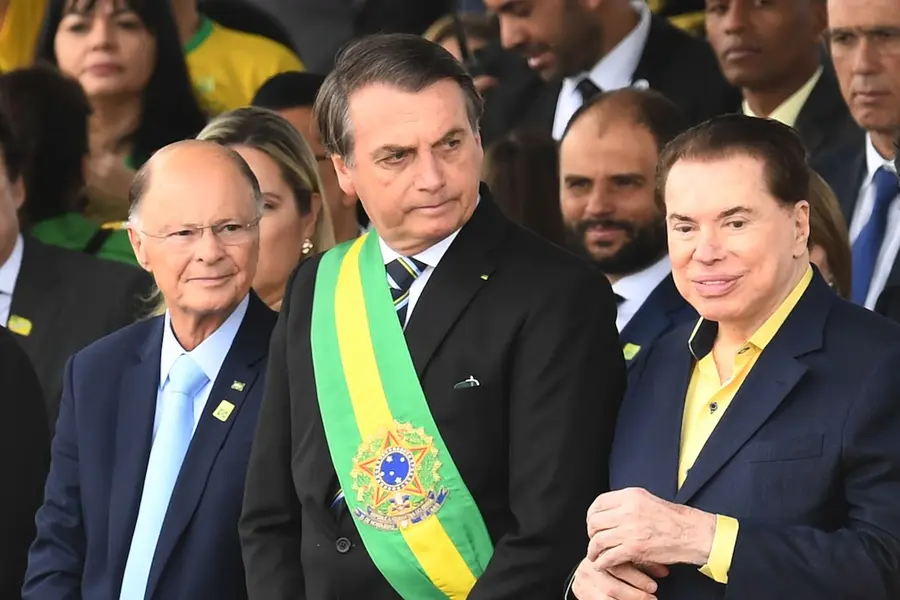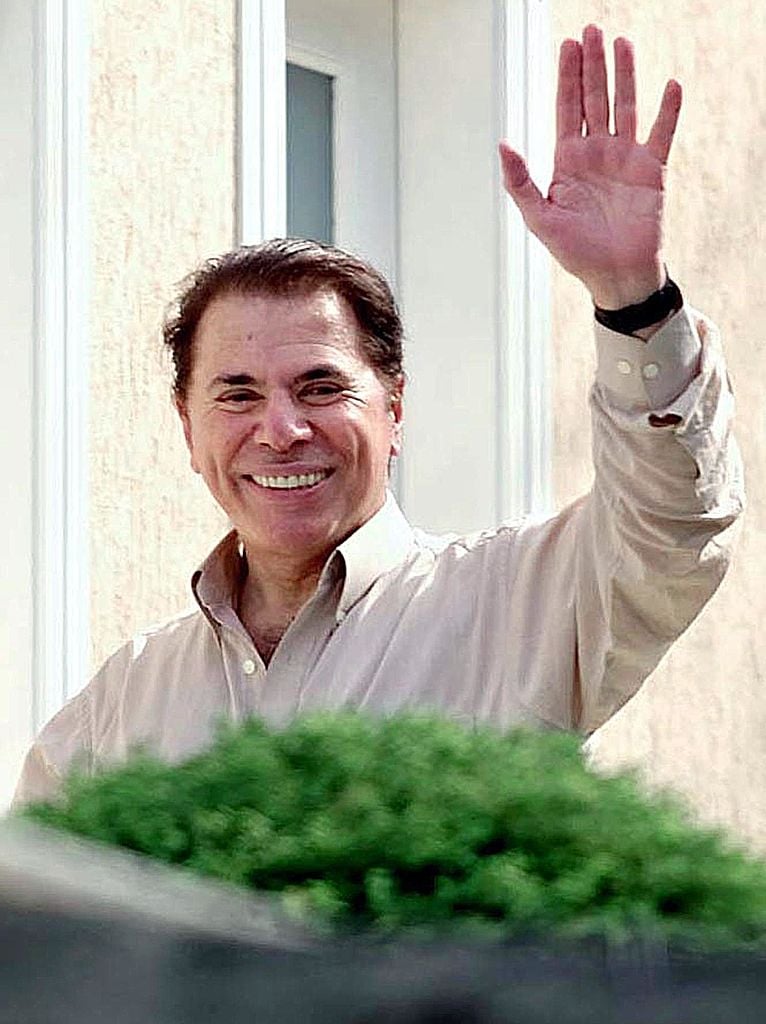Contrary to what you might assume, for many years, the most famous person in Brazil wasn't a movie star, a soccer star, or even one of the country's many gorgeous supermodels. Without question, he was the most famous celebrity in Brazil was a television host named Silvio Santos.
Silvio Santos wasn't just a TV personality—he was a Sunday-night institution. His variety show ran for decades, practically as long as television has existed in Brazil. He was a quadruple threat: He had Regis Philbin's boundless enthusiasm, the ageless charm of Dick Clark, the showman's flair (and hairline) of Liberace, and the entrepreneurial magic touch of Richard Branson.
But perhaps most remarkably, Silvio came from nothing. He started out selling pens and plastic sleeves on the streets of Rio de Janeiro and climbed all the way to the top—becoming not just a beloved entertainer, but a billionaire media tycoon whose life inspired books, a movie, and even a samba parade during Carnival.

Silvio Santos, far right (EVARISTO SA/AFP via Getty Images)
Early Life and Rise in Media
Silvio Santos was born Senor Abravanel in 1930 in Rio's working-class Lapa neighborhood, the son of Greek and Turkish Sephardic Jewish immigrants. By the age of 14, he was working as a street vendor to help support his family. Selling toys, wallets, and card sleeves, he attracted crowds by performing magic tricks and coin flips—turning sales into a performance.
A radio producer spotted his talent and offered him a shot as an announcer. He took the job but returned to the streets after a month when he realized vending paid better. Still, the experience planted a seed. After a stint in the military, Silvio moved to São Paulo and began hosting raffles and emceeing live events at fairs. His booming voice and natural showmanship drew big crowds—and eventually the attention of television producers.
He landed a recurring segment on a local variety show and used his earnings to purchase the Baú da Felicidade ("Chest of Happiness"), a prize-giveaway business that sold promotional tickets redeemable for merchandise. He restructured the company and heavily promoted it on TV, transforming it into a national phenomenon. The visibility from Baú da Felicidade made Silvio a household name—and set the stage for something much bigger.
Founding of SBT
By the late 1970s, Silvio Santos was not just one of the most popular television hosts in Brazil—he was one of the most powerful figures in Brazilian media. His prize giveaways and variety shows consistently drew massive audiences, and he had already proven himself a savvy businessman through the success of Baú da Felicidade and other ventures. But for a man with Silvio's ambition, it wasn't enough to appear on television. He wanted to own the television.
That opportunity came in 1981, when the Brazilian government opened bidding to assign new licenses for national television networks. Silvio seized the moment. With the backing of his existing companies and a deep understanding of what Brazilian audiences loved, he won the license and launched Sistema Brasileiro de Televisão, or SBT, on August 19, 1981. The network began broadcasting from São Paulo with a blend of imported programming, children's shows, soap operas, and, of course, Silvio himself as the centerpiece.
What made SBT unique from the start was its populist, variety-driven programming—geared toward families, working-class viewers, and everyday Brazilians who saw Silvio as one of their own. It was bright, chaotic, unpredictable, and always entertaining. Shows like "Programa Silvio Santos," "Show de Calouros," and "Domingo no Parque" became Sunday staples, often dominating national ratings.
SBT quickly grew into one of Brazil's most-watched networks, consistently competing with giants like Rede Globo. But unlike its rivals, SBT wasn't just a media company—it was a platform for Silvio to cross-promote his other businesses. Products from his companies were seamlessly woven into the programming, including giveaways, branded games, and on-air promotions for everything from cosmetics to lottery bonds.
Billionaire Status
Within a few short years, Silvio Santos had accomplished something unprecedented: he was not only the star of Brazil's top-rated programs—he owned the network they aired on. It was the ultimate vertical integration of fame, commerce, and influence. And it cemented Silvio Santos as more than just a television host—he was now a full-fledged media tycoon.
In 2013, his decades of work culminated in a new milestone: Silvio was officially declared a billionaire, with a net worth of $1.3 billion. That made him the first celebrity billionaire in Brazilian history, one of the richest people in Brazil, and one of the very few media personalities anywhere in the world to build such massive wealth independently, outside of Hollywood.
The Grupo Silvio Santos Empire
Owning a national TV network was just the beginning. With SBT as the crown jewel, Silvio Santos spent the next several decades building Grupo Silvio Santos, a sprawling conglomerate of over 30 companies spanning media, finance, real estate, retail, and cosmetics. At its height, the group employed more than 8,000 people and generated over $2 billion in annual revenue.
One of the group's most successful and enduring products has been Tele Sena, a lottery-style capitalization bond first launched in 1991. Sold through Silvio's television programming and promoted relentlessly by the man himself, Tele Sena allows customers to recover part of their investment after one year while also entering them into prize drawings. With over 50 million bonds sold annually, the product reportedly generates more than $150 million per year in revenue.
Another key venture was Jequiti, a direct-sales cosmetics company Silvio launched in 2006. Inspired by the model used by global brands like Avon and Natura, Jequiti quickly became one of Brazil's fastest-growing beauty businesses. Its rapid expansion attracted interest from multinational giants like Coty and L'Oréal, and at one point, investment bank Barclays was hired to explore a possible sale that valued the company at up to $500 million.
Grupo Silvio Santos also invested heavily in real estate development and hospitality, including a partnership with the Accor Hotel Group on the Sofitel Jequitimar Guarujá resort on the São Paulo coast. For a time, the conglomerate even owned Banco Panamericano, a consumer finance bank that served Brazil's growing lower-middle class. Although the bank later became embroiled in an accounting scandal and was sold in 2011 to BTG Pactual, Silvio was able to walk away from the crisis largely unscathed.
Later Years, Challenges, and Legacy
Even at the height of his fame and fortune, Silvio Santos remained one of Brazil's most approachable and enigmatic public figures. In 1989, he shocked the country by briefly entering politics, launching a presidential campaign just weeks before the election. His outsider appeal and populist charisma made him an instant threat to the political establishment, but a technical ruling from Brazil's electoral court disqualified his candidacy before ballots were cast. Though short-lived, the campaign solidified his image as a man of the people—someone who could plausibly leap from television to the presidency.
Not all of Silvio's later years were smooth. In 2001, his daughter Patricia was kidnapped outside her home in São Paulo. After a week-long standoff and a $200,000 ransom, she was released unharmed. The incident became even more surreal when the kidnapper later fled to Silvio's own house, triggering a tense, hours-long standoff with police that was broadcast live on Brazilian TV. The governor of São Paulo had to personally intervene to bring the situation to a peaceful end. After being released following the seven-hour hostage situation, Silvio appeared on his balcony and waved to the cameras:

Rags to Riches – Silvio Santos /MAURICIO LIMA/AFP/Getty Images
In 2010, one of his biggest business ventures, Banco Panamericano, was rocked by a $2.3 billion accounting fraud. Facing massive losses, Silvio turned to then-president Lula da Silva for help. The government-backed Brazilian Development Bank extended a $1.25 billion emergency loan to bail out the institution. Silvio eventually sold the bank and offloaded its debt—but the episode marked one of the few public stumbles in his otherwise golden career.
In his final years, Silvio gradually stepped back from the spotlight. His daughter Patricia began co-hosting his Sunday show and ultimately took over its regular hosting duties. Silvio's last on-air appearance came in 2021, and he formally retired from television in 2023 after more than six decades on the air.
Death and National Mourning
Silvio Santos died on August 17, 2024, at the age of 93, after being hospitalized for complications from H1N1 influenza that developed into bronchopneumonia. He passed away at Hospital Israelita Albert Einstein in São Paulo. In response, President Luiz Inácio Lula da Silva declared three days of national mourning, calling Silvio "the greatest personality in the history of Brazilian television."
SBT paid tribute with a heartfelt message:
"He lived 93 years to bring happiness and love to all Brazilians. That wide smile and familiar voice will forever be remembered with much gratitude."
Silvio Santos spent more than six decades on air. His life was a rare fusion of performance, persuasion, and profit. He was Brazil's most iconic entertainer, its most unlikely billionaire, and perhaps the only man who could say this with full credibility:
"I'm just a street peddler in a suit and tie… selling my products, selling the ads, the programs. I also believe it's the voice—because it's the voice that touches the viewer."
Silvio Santos wasn't just a showman. He was a builder. A brand. A legend. And for generations of Brazilians, he was the sound of Sunday.
/2013/02/Silvio-Santos-1.jpg)
/2014/08/Deborah-Secco.jpg)
/2010/08/Johnny-Carson.jpg)
/2016/05/Ibrahim-Tatlises.png)
/2014/07/Cristiana-Oliveira.jpg)
/2015/02/taylor-selena.png)
/2009/11/George-Clooney.jpg)
:strip_exif()/2009/09/P-Diddy.jpg)
/2017/02/GettyImages-528215436.jpg)
/2018/03/GettyImages-821622848.jpg)
/2019/11/GettyImages-1094653148.jpg)
/2020/01/lopez3.jpg)
/2020/02/Angelina-Jolie.png)
/2020/06/taylor.png)
/2019/04/rr.jpg)
:strip_exif()/2015/09/GettyImages-476575299.jpg)
/2020/04/Megan-Fox.jpg)
/2009/09/Cristiano-Ronaldo.jpg)
/2009/09/Jennifer-Aniston.jpg)
/2009/09/Brad-Pitt.jpg)
/2019/10/denzel-washington-1.jpg)